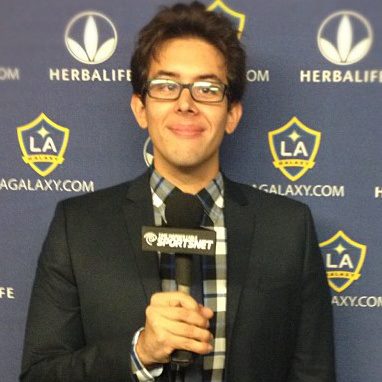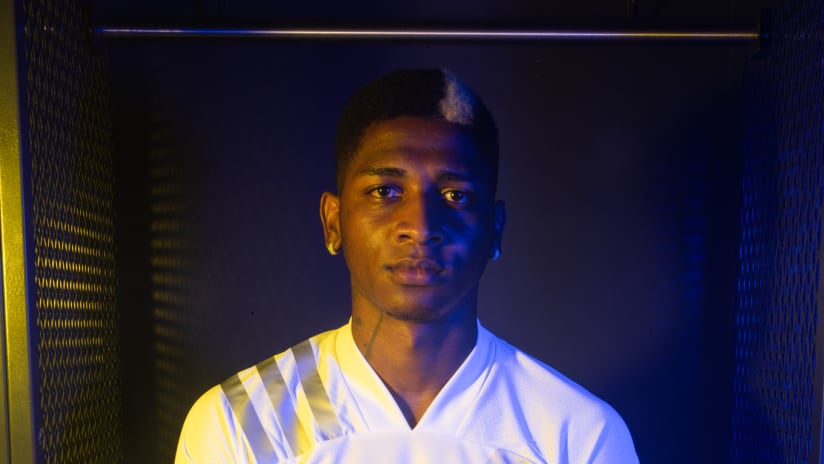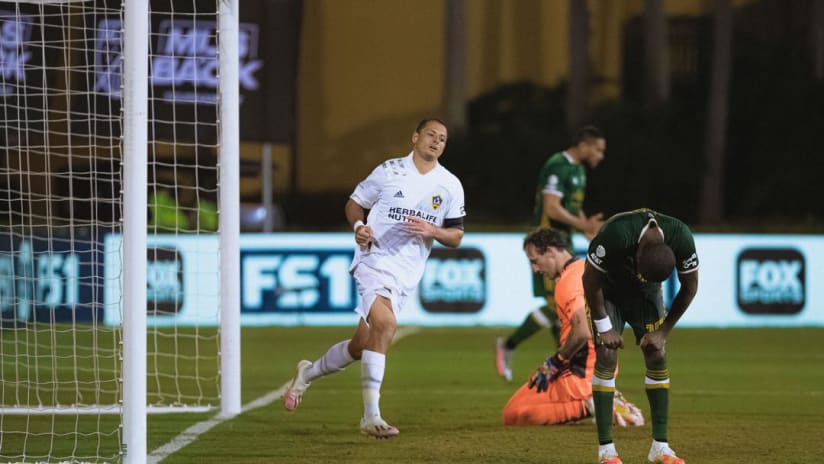Life is a process of continual evolution for LA Galaxy defender Robbie Rogers both on the field and off.
In my latest piece for LAGalaxy.com, I spoke to Rogers about his attempt to reconnect with U.S. head coach Jurgen Klinsmann and the defender’s perceptions on his legacy as the first openly gay athlete in a major American professional sport. However not all of my conversation with Rogers made the story.
Below are other excerpts from Rogers discussing his book Coming out to Play and his continued growth as a soccer player and a person.
(On his decision to write his book…)
ROGERS: It was definitely more about – After I came out publicly and had that relation from people which was something that I didn’t think would happen in a million years, I realized that I could write a book about my story which so many people can relate to. The biggest difference that I’ve made is just being on the field and then afterward writing a book and going into detail and exposing a vulnerable part of myself helps as much as being on the field and playing.
(On his transformation as a gay athlete…)
ROGERS: “For me, it was about first whether my teammates respected me and if they did respect me and enjoyed playing with me. Of course, you want to accomplish things on the field. This year, especially, I was never thinking of myself as a gay athlete. That’s the big difference between 2013 and 2014, last year I was on the road and I was the only gay guy and I had to deal with that which wasn’t because of how I was treated by the team but what I was dealing with. This year, there were so many times where it just wasn’t even an issue. I never had to talk about it. This year, I realized that when the book was coming out then but I would just not think about it.”
(On how Rogers ultimately hopes that he’s remembered when he decides to retire…)
ROGERS: I hope that I have a good enough career and I’m successful enough that people just think about me as a player on the Galaxy who helped win championships and played for good teams. I hope teammates like Landon, Robbie and Omar can remember me as a guy on their team who was a good soccer player and a good person, regardless of me being gay or straight.
(On whether he understands the conceptual change within him…)
ROGERS: I was so introverted and I was so afraid to have close relationships because I was afraid that people would get to know me. I was afraid to be this crazy person on the dance floor. I was so afraid of so many things and this year, it was so completely different and I’m so happy that I’m able to enjoy it. After all, if you can’t enjoy winning a championship, what is the point of being a professional soccer player? What’s the point of being successful in any career if you can’t enjoy the little moments where you have a triumph. I think a lot of people can’t enjoy moments because they want to move onto what’s next, but I know that in that moment especially after what happened a few years earlier, I just had to cry. I was happy to show that emotion to them as well that they see that he’s human.
(On the distinct difference between how he acted as a child and today…)
ROGERS: It’s really sad. It’s so sad how depressed and how homophobic I was to myself. I was simply isolated and alone, and afraid to share this side to anyone even myself. It’s been two years since I came out and it’s incredible how different things have been. My family wasn’t ready to support same sex marriage but now they can’t wait till I get married. It’s crazy how things change so quickly. I can’t explain that. It’s really changed overnight.
(On whether he expected any anger from his stories in the book…)
ROGERS: This is all a learning experience. Everything in the book is the truth but I’ve just been supported by everyone that I spoke about in the book. I was able to then come out and move back to the states and go through everything that I went to. I heard the most ridiculous things from people who love me so much and I realized that they’re not homophobic they say things because their church tells them to or to make people around them laugh or they’re supposed to. I learned that people aren’t homophobic but have this pack mentality which I was part of when I was younger.
(On dealing with the locker room mentality and the focus that has gotten since his announcement…)
ROGERS: When you live that your life, you’ve seen in it. Whether it was Columbus or Leeds or Holland or college or even when I was younger in High School, you hear on a daily basis that you shouldn’t be such an [expletive] or don’t be so gay. These are really things that you think when you are gay and you are raised that is wrong and you hear them, it slowly chips away at you. It makes you feel like you ever accept that side of you that something will change and they might not accept you. It scared the [expletive] out of me.
(On how his own insecurities played into the writing of his book…)
ROGERS: I didn’t know the book would be so therapeutic. Just sitting with Eric and writing and talking for hours and hours helped me realized that I was raised for so long in an environment where I couldn’t express myself. I’m still really bad at expressing myself and being open with people because for 20 years, I wasn’t. Nothing changes over night. But Eric would say to me that he’s 50 and he’s still working on all his flaws. I didn’t realize that was going to happen or take place. Our hope was to write a book that would reach people that had a gay son or knew someone that was gay and could read this and pass it along, but also help that person [that was reading]through whatever they were dealing with.
(On a unique experience speaking to people a book signing at a Los Angeles CostCo...)
ROGERS: Usually when you have an appearance or a book signing, people know who you are but at Costco, they don’t have a connection [with a gay person]. People were coming up to me asking who I and I’d tell them, they’d sit there and read the book. They’d stand there and just keep reading then tell me ‘oh my gosh, this is a great story. It’s so great that you’re doing” then they ended up buying a copy and telling me, I’m going to read this or give it to someone else and pass it along. I thought that this is great because not all these people are gay but they can read the story and connect to it. They realize that it’s about someone who has a coming out experience that feels isolated and depressed at some point. They can pick the book up and relate to it. That was our hope, to connect with people that weren’t necessarily in the LGBT community but felt that they had a coming out (either they had a divorce or changed religions and had to confront their family about it) we knew that.”
(On his perceptions on the frustrating 2013 season with the Galaxy…)
ROGERS: It was weird. Even last year, I thought to myself that I hope other people come out because I didn’t want to be the only gay athlete. I remember that 2013 was tough. I remember saying to my family that even when you come out, everything isn’t great. You’re still struggling with a lot of things. This year was more about finding a balance and being at peace with what I’m doing. I’m not just a gay athlete, I play for the Galaxy, I’m a left back and we have a good team. It was more than just that. It was just figuring out my life and being comfortable. I had just come out six months before I started playing with the Galaxy. It’s not like you just come out and you’ve solved everything in life because you’re still a 20-something trying to figure stuff out. But the book did help me figure out stuff about myself.”





